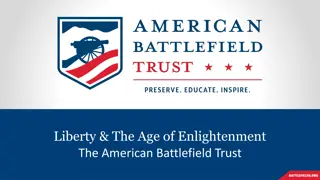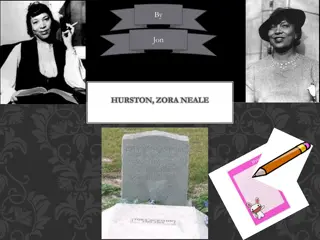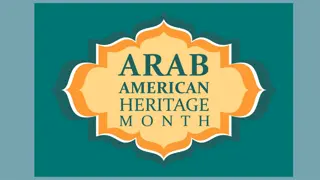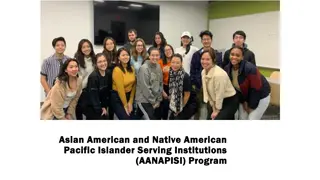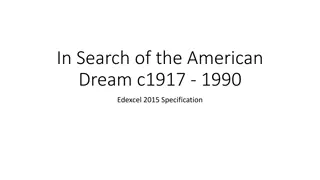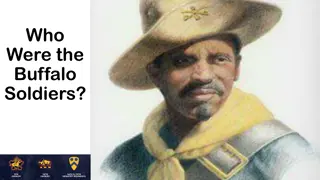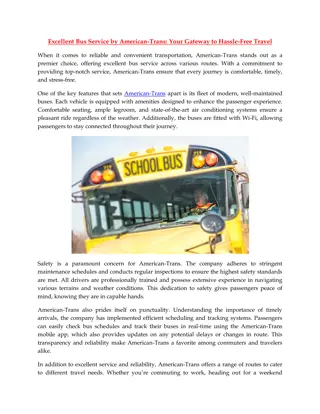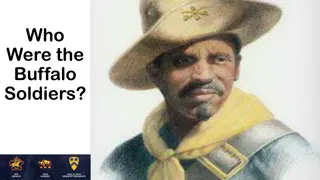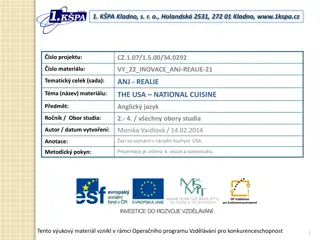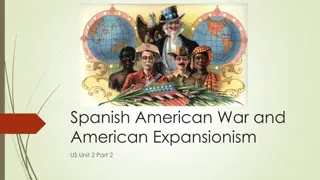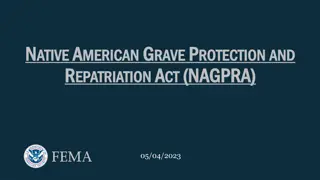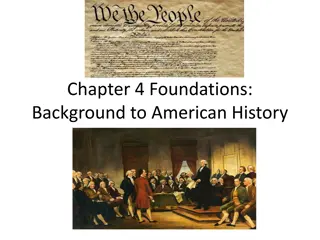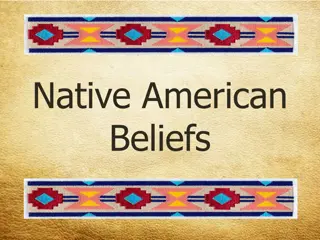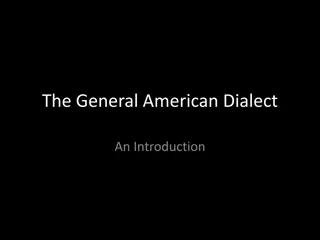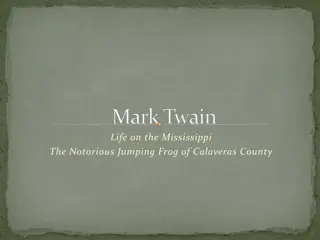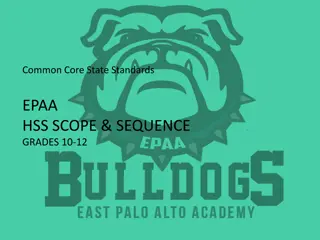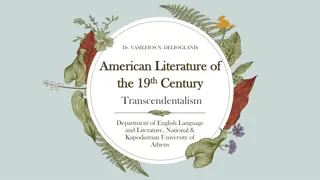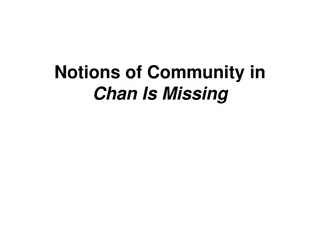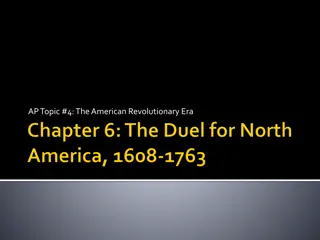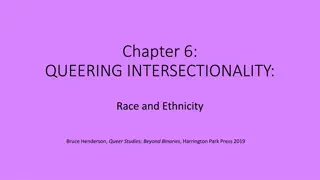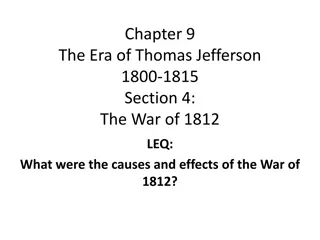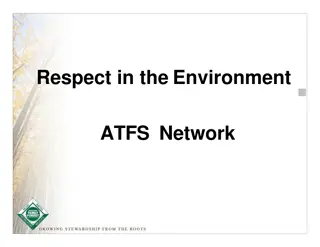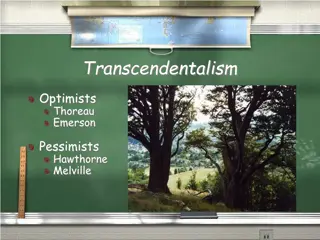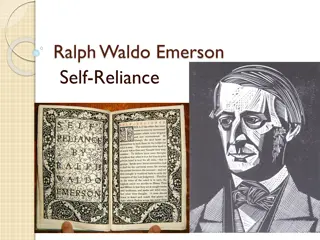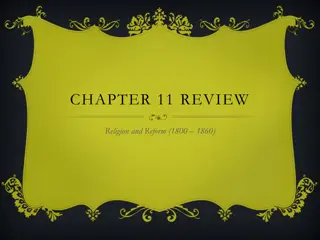Exploring American Transcendentalism: Texts, Context, and Legacy
Delve into the origins, core beliefs, major figures, and influences of American Transcendentalism, a movement that emerged in reaction to prevailing intellectual theories regarding spirituality, social life, education, and nature. Discover the thoughts of prominent figures like Ralph Waldo Emerson o
0 views • 18 slides
Black Minds Matter 2: Advocating for African American Mental Health Awareness
Promoting African American mental health awareness through initiatives like Black Minds Matter 2, focused on holistic wellness and community support. Advocacy for racial sensitivity and cultural understanding in mental health services to address needs effectively. Survey insights show importance of
1 views • 22 slides
Liberty & The Age of Enlightenment The American Battlefield Trust
The Age of Enlightenment, with its emphasis on natural law, liberty, progress, and constitutional government, greatly influenced American thinking and the Revolutionary War. Key figures like John Locke and Sir William Blackstone contributed ideas of social contract and law that shaped American gover
2 views • 15 slides
Latin America Society of American Nuclear Society - Overview and Governance
The Latin American Section of the American Nuclear Society (LAS/ANS) was established in 1975 to represent nuclear professionals across Latin America. It focuses on promoting nuclear science and technology in various fields, facilitating research and education, organizing technical meetings, and fost
2 views • 43 slides
Zora Neale Hurston: African-American Writer of the Harlem Renaissance
Zora Neale Hurston, born in Notasulga, Alabama, in 1891, was a prominent African-American writer known for her works reflecting the African-American culture and folklore. Growing up in Eatonville, Florida, and later studying at Barnard College, she stood out among her contemporaries for her portraya
2 views • 4 slides
The American Soldier: Studies in Social Psychology in World War II
In the book "The American Soldier: Studies in Social Psychology in World War II," published in the United States between 1949 and 1950, research on the morale and attitudes of American troops during World War II is examined. The research project was initiated by the Army's Information and Education
4 views • 18 slides
Celebrating Arab American Heritage: Culture, Diversity, and Contributions
Explore the rich heritage of Arab Americans, encompassing a diverse group with roots in 22 Arab countries across Northern Africa to Western Asia. Discover their language, culture, and significant contributions to American society. Learn about Arab American Heritage Month and educational resources to
0 views • 8 slides
Overview of AANAPISI Program in the United States
The Asian American and Native American Pacific Islander Serving Institutions (AANAPISI) Program aims to support institutions with a minimum of 10% Asian American and Native American Pacific Islander undergraduate enrollment. Currently, there are 54 funded AANAPISI institutions across 16 states and t
0 views • 13 slides
Exploration of the Evolution of American Society and Culture, 1917-1990
Delve into the multifaceted facets of American society and culture from 1917 to 1990 with a deep dive into the changing roles of women, political landscape shifts, influences of immigration, impact of wars on domestic politics, economic influences, quest for civil rights, changing living standards,
0 views • 6 slides
The Legacy of the Buffalo Soldiers in American History
The Buffalo Soldiers were African-American cavalry regiments in the U.S. Army, known for their bravery and valor during the late 19th and early 20th centuries. Former slaves seeking opportunities after the Civil War, these soldiers played crucial roles in Westward expansion, major conflicts, and Ind
1 views • 16 slides
Exploring American Monsters: From Bigfoot to Cannibals
Delve into the world of American monsters as we uncover the mysteries surrounding creatures like Bigfoot, Wendigo, and Alferd Packer, the Colorado cannibal. Discover the symbolic significance, cultural metaphors, and historical contexts that shape these monstrous legends in American folklore.
0 views • 5 slides
Trailblazers in African American Medicine: A Tribute to Pioneers
African Americans in the medical field have faced historical challenges and injustices, leading to a significant distrust towards the healthcare community. Despite this, individuals like Dr. Charles Drew, Dr. Rebecca Lee Crumpler, and Dr. James McCune Smith defied the odds and made groundbreaking co
0 views • 13 slides
Excellent Bus Service by American-Trans Your Gateway to Hassle-Free Travel
When it comes to reliable and convenient transportation, American-Trans stands out as a premier choice, offering excellent bus service across various routes. With a commitment to providing top-notch service, American-Trans ensure that every journey is comfortable, timely, and stress-free.
1 views • 2 slides
The Legacy of the Buffalo Soldiers: African American Pioneers in U.S. Military History
Discover the remarkable story of the Buffalo Soldiers, African American men who served with courage and honor in the U.S. Army after the Civil War. Through their contributions to westward expansion and participation in major conflicts, these soldiers left a lasting impact on American history. Their
0 views • 16 slides
American Cuisine: A Mix of Flavors and Fast Food Culture
American cuisine is a diverse blend of flavors from different cultures with the hamburger being a popular dish. Breakfast includes eggs, meat, and a variety of bread options, while lunch is often fast food. Popular fast food chains like McDonald's offer grilled chicken, burgers, and desserts like ap
1 views • 13 slides
Evolution of American English Vocabulary and Language Features
American English exhibits arachaic features and early changes in vocabulary due to colonial influences and the distinct political and administrative system. The language has preserved old-fashioned elements from the seventeenth and eighteenth centuries, while also incorporating new words inspired by
0 views • 5 slides
Spanish-American War and American Expansionism: A Look Back in History
Explore the causes and impacts of the Spanish-American War, including the influence of Yellow Journalism, nationalism, and imperialism on American expansionism during the late 1800s. Learn about key figures like Theodore Roosevelt and the Rough Riders, and the significance of policies like the Monro
0 views • 25 slides
Cultural Awareness for Drug Courts Working with Native American Participants
Understanding the cultural nuances of Native American communities is crucial for Drug Courts collaborating with Tribal Healing to Wellness Courts. This involves acknowledging tribal sovereignty, regional and cultural differences, customs, spirituality, and communication styles unique to American Ind
0 views • 22 slides
Native American Repatriation and NAGPRA Overview
The Native American Graves Protection and Repatriation Act (NAGPRA) enacted since November 1990 establishes ownership of cultural items excavated on Federal or Tribal land. It requires returning such items to Native American descendants and affiliated tribes. The Act also criminalizes trafficking in
1 views • 8 slides
Exploring Transcendentalism in Modern Society
Transcendentalism, a movement from the 1800s, continues to influence modern society. This article delves into the aspects of non-conformity, importance of nature, self-reliance, civil disobedience, and simplified life, providing examples like Lady Gaga to showcase how these principles manifest in cu
0 views • 4 slides
American Revolutionary Era: Key Events and Figures
The American Revolutionary Era marked by the formation of the Constitution, Washington's militia, key figures like Jonathan Trumbull and John Peter Muhlenberg, the emergence of American culture, the Articles of Confederation, and calls for a stronger government. This period saw a shift towards a mor
0 views • 17 slides
Exploring Native American Beliefs and Spiritual Practices
Delve into the rich tapestry of Native American beliefs, traditions, and spiritual practices, including their diverse worldviews, sacred connections to nature, and unique cultural expressions. Discover the origins of terms like "Indian" and the vast linguistic diversity among different Nations. Cont
3 views • 13 slides
Washington Irving: Father of American Fiction and Pioneer of American Romanticism
Washington Irving, an influential American author of the early 19th century, is revered as the Father of American fiction. Known for iconic works like "The Legend of Sleepy Hollow" and "Rip Van Winkle," Irving played a crucial role in establishing American literature as an independent art form. His
1 views • 14 slides
Overview of the General American Dialect
The General American Dialect, also known as GenAm, is a widely preferred dialect of English characterized by minor differences in pronunciation compared to regional American accents. It is distinct from Southern, Midwestern, and Northeastern accents and is one of the two global English dialects alon
0 views • 13 slides
Understanding Romanticism and Transcendentalism in Early American Literature
Exploring the defining characteristics of American Romanticism, such as a focus on nature, individualism, and self-reliance, alongside the beliefs and teachings of Transcendentalists like Thoreau and Emerson. Contrasting these literary movements as reactions to established norms and traditions, emph
0 views • 16 slides
Mark Twain's Humorous Tales and Regionalism in American Literature
Mark Twain, a master of humor and regionalism, depicted American culture in a distinctive way through his works such as "The Notorious Jumping Frog of Calaveras County" and "Life on the Mississippi." His stories showcase exaggerated characters, humorous situations, and unique dialects, reflecting th
0 views • 8 slides
American History Curriculum for Grade 11 - Semester 1
This American history curriculum for Grade 11 Semester 1 covers key topics such as the Declaration of Independence, American Revolution, industrialization, urbanization, immigration, imperialism, and the United States' emergence as a world power. Students will examine diverse aspects of American his
0 views • 11 slides
Transcendentalism and American Individualism in the 19th Century
Explore the essence of Transcendentalism through the works of Ralph Waldo Emerson and Henry David Thoreau, focusing on self-reliance, spiritual vision, and resistance to societal norms. Delve into their philosophical perspectives on the unity of the world, individualism, and the pursuit of a higher
0 views • 13 slides
Unit Assessment Review: U.S. Imperialism History Lesson
Review session for upcoming history unit assessment on U.S. Imperialism. Topics covered include key events such as the Philippines under American control, reasons for Mark Twain's anti-Imperialist stance, factors driving American foreign policy towards imperialism, the case of Hawaii's Queen Liliuok
0 views • 15 slides
Exploring Asian American Identity Through "Chan Is Missing" by Wayne Wang
Chan Is Missing" (1982) directed by Wayne Wang is a groundbreaking Asian American independent feature film that delves into themes of Asian American identity, hyphenated identity, assimilation, and hybridity. The film, shot on a shoestring budget in San Francisco's Chinatown, showcases the community
0 views • 26 slides
The American Revolutionary Era Overview
The American Revolutionary Era marked a period of intense rivalry between France, England, and Spain for control of North America, leading to conflicts like the French & Indian War. Key events such as the founding of Quebec, exploration by Robert de La Salle, and establishment of New Orleans shaped
0 views • 39 slides
Influence of American Culture on American Christianity: A Critical Analysis
This content explores the relationship between American culture and American Christianity, discussing how religion reflects the cultural values of individualism, optimism, and the concept of a blessed nation. It delves into the concept of Biblical individualism, the influence of prosperity gospel, a
1 views • 7 slides
Exploring Queer Identities in Native American and African-American Communities
Delve into the nuanced intersections of race, ethnicity, and queerness within Native American and African-American communities. From the reclaiming of Two-Spirit identities to the presence of queer writers in literary spaces, this exploration sheds light on the complexities of identity, resistance t
0 views • 38 slides
The War of 1812: Causes, Events, and Effects
The War of 1812 was influenced by issues such as British impressment of American sailors, arming Native Americans, and trade restrictions. Despite opposition, President James Madison declared war in 1812. The conflict marked a period of American nationalism, with War Hawks pushing for war and Doves
0 views • 16 slides
Promoting Respectful and Safe Environments in the American Forest Foundation
This content highlights the importance of maintaining a respectful and safe environment, particularly within the American Forest Foundation and the American Tree Farm System. It emphasizes understanding and appreciating the distinguishing characteristics of individuals, recognizing and addressing ha
0 views • 35 slides
American Literature Through the Ages
Explore the rich tapestry of American literature covering American Indian culture, New England Puritanism, the 18th century American Enlightenment, and the American Renaissance. Discover the oral traditions of American Indian tribes, the puritanical values of New England, the democratic origins of A
0 views • 17 slides
Insights from Emerson: Transcendentalism, Self-Reliance, and Authenticity
Explore the philosophy of transcendentalism through the lens of Ralph Waldo Emerson, focusing on concepts like self-reliance, nonconformity, and being true to oneself. Emerson emphasizes the importance of trusting one's own intuition, embracing individuality, and rejecting conformity as a barrier to
0 views • 29 slides
Ralph Waldo Emerson: The Sage of Concord and Transcendentalism
Ralph Waldo Emerson, a key figure in the transcendentalist movement, advocated self-reliance, spiritual independence, and nonconformity. He emphasized individualism, belief in oneself, and living in harmony with nature. Emerson's philosophy of transcendentalism shaped his famous essay "Self-Reliance
1 views • 11 slides
Religion and Reform: 19th Century Ideologies and Movements
Explore the influence of individualism through transcendentalism, rural communalism, and urban popular culture in the 1800s. Delve into the ideologies of Ralph Waldo Emerson, Henry David Thoreau, Margaret Fuller, and Walt Whitman. Learn about utopian societies, the Mormon experience, and nativist mo
0 views • 15 slides
Cardio-metabolic Abnormalities Among Normal Weight Individuals: A Cross-sectional Analysis of Race/Ethnicity in the U.S.
Overweight and obesity are known cardio-metabolic risk factors, but this study delves into abnormalities among normal-weight individuals. The research compares data from MESA and MASALA studies, including diverse race/ethnicity groups like White, African American, Hispanic American, Chinese American
1 views • 23 slides


